Polycystic Ovary Syndrome (PCOS): Symptoms, Causes, and Treatment By Dr. Pooja Bansal
PCOS is a problem with hormones that affects women during their childbearing years (ages 15 to 44). Between 2.2 and 26.7 percent of women in this age group have PCOS.
Many women have PCOS but don’t know it. In one study, up to 70 percent of women with PCOS hadn’t been diagnosed (2Trusted Source).
PCOS affects a woman’s ovaries, the reproductive organs that produce estrogen and progesterone — hormones that regulate the menstrual cycle. The ovaries also produce a small number of male hormones called androgens.
The ovaries release eggs to be fertilized by a man’s sperm. The release of an egg each month is called ovulation.
PCOS is a “syndrome,” or group of symptoms that affects the ovaries and ovulation. Its three main features are:
cysts in the ovaries
high levels of male hormones
irregular or skipped periods
In PCOS, many small, fluid-filled sacs grow inside the ovaries. The word “polycystic” means “many cysts.”
What causes it?
Doctors don’t know exactly what causes PCOS. They believe that high levels of male hormones prevent the ovaries from producing hormones and making eggs normally.
Genes, insulin resistance, and inflammation have all been linked to excess androgen production.
Common symptoms of PCOS
Some women start seeing symptoms around the time of their first period. Others only discover they have PCOS after they’ve gained a lot of weight or they’ve had trouble getting pregnant.
The most common PCOS symptoms are:
Irregular periods.
Heavy bleeding.
Hair growth.
Acne.
Weight gain.
Male-pattern baldness.
Darkening of the skin.
Headaches
How PCOS affects your body
Having higher-than-normal androgen levels can affect your fertility and other aspects of your health.
Infertility
Metabolic syndrome
Sleep apnea
Endometrial cancer
Depression
How PCOS is diagnosed
Doctors typically diagnose PCOS in women who have at least two of these three symptoms like high androgen levels irregular menstrual cycles cysts in the ovaries
When to see a doctor
See your doctor if:
You’ve missed periods and you’re not pregnant.
You have symptoms of PCOS, such as hair growth on your face and body.
You’ve been trying to get pregnant for more than 12 months but haven’t been successful.
You have symptoms of diabetes, such as excessive thirst or hunger, blurred vision, or unexplained weight loss.
If you have PCOS, plan regular visits with your primary care doctor. You’ll need regular tests to check for diabetes, high blood pressure, and other possible complications.
For More Information
Consult with Doctor
Dr. Pooja Bansal
www.drpoojabansal.com
Many women have PCOS but don’t know it. In one study, up to 70 percent of women with PCOS hadn’t been diagnosed (2Trusted Source).
PCOS affects a woman’s ovaries, the reproductive organs that produce estrogen and progesterone — hormones that regulate the menstrual cycle. The ovaries also produce a small number of male hormones called androgens.
The ovaries release eggs to be fertilized by a man’s sperm. The release of an egg each month is called ovulation.
PCOS is a “syndrome,” or group of symptoms that affects the ovaries and ovulation. Its three main features are:
cysts in the ovaries
high levels of male hormones
irregular or skipped periods
In PCOS, many small, fluid-filled sacs grow inside the ovaries. The word “polycystic” means “many cysts.”
What causes it?
Doctors don’t know exactly what causes PCOS. They believe that high levels of male hormones prevent the ovaries from producing hormones and making eggs normally.
Genes, insulin resistance, and inflammation have all been linked to excess androgen production.
Common symptoms of PCOS
Some women start seeing symptoms around the time of their first period. Others only discover they have PCOS after they’ve gained a lot of weight or they’ve had trouble getting pregnant.
The most common PCOS symptoms are:
Irregular periods.
Heavy bleeding.
Hair growth.
Acne.
Weight gain.
Male-pattern baldness.
Darkening of the skin.
Headaches
How PCOS affects your body
Having higher-than-normal androgen levels can affect your fertility and other aspects of your health.
Infertility
Metabolic syndrome
Sleep apnea
Endometrial cancer
Depression
How PCOS is diagnosed
Doctors typically diagnose PCOS in women who have at least two of these three symptoms like high androgen levels irregular menstrual cycles cysts in the ovaries
When to see a doctor
See your doctor if:
You’ve missed periods and you’re not pregnant.
You have symptoms of PCOS, such as hair growth on your face and body.
You’ve been trying to get pregnant for more than 12 months but haven’t been successful.
You have symptoms of diabetes, such as excessive thirst or hunger, blurred vision, or unexplained weight loss.
If you have PCOS, plan regular visits with your primary care doctor. You’ll need regular tests to check for diabetes, high blood pressure, and other possible complications.
For More Information
Consult with Doctor
Dr. Pooja Bansal
www.drpoojabansal.com


Comments
Post a Comment